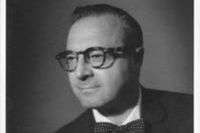Stanley Levison
Stanley David Levison (May 2, 1912 – September 12, 1979) was an American businessman and lawyer who became a lifelong activist in progressive causes. He is best known as an advisor to, and close friend of Martin Luther King Jr., for whom he helped write speeches, raise funds, and organize events.
Stanley David Levison | |
|---|---|
 | |
| Born | May 2, 1912 |
| Died | September 12, 1979 (aged 67) |
| Nationality | American |
| Alma mater | St. John's University University of Michigan |
| Occupation | Businessman, lawyer |
| Known for | March on Washington |
Life
Stanley David Levison was born in New York City on May 2, 1912, to a Jewish family. Levison attended the University of Michigan, Columbia University, and the New School for Social Research. He received two law degrees from St. John's University. While serving as treasurer of the American Jewish Congress in Manhattan, he aided in the defense of Julius and Ethel Rosenberg. During this period, he worked for a variety of liberal causes.[1]
In the early 1950s the FBI considered Levison to be a major financial coordinator for the Communist Party USA (CPUSA) and began to monitor his activities. The FBI had him under the surveillance of Jack and Morris Childs, two former CPUSA members who became FBI informants. According to the FBI, Levison's CPUSA activities ended in 1957.[2]
He had initially been introduced to King by Bayard Rustin, a Quaker, in New York City in 1956. Though King had offered to pay Levison in exchange for his help, Levison refused on every occasion, as he believed "the liberation struggle is the most positive and rewarding area of work anyone could experience."[1]
He was questioned by the FBI twice, on February 9 and March 4, 1960.[3] Two years later, on April 30, 1962, he was called to testify under subpoena at an executive session of the Senate Subcommittee on Internal Security, where he was represented by William Kunstler. Large parts of his testimony are still classified.[4]
Although there was no evidence of Levison having further ties to the CPUSA, the FBI used his earlier communist history to justify wiretaps and bugs on his offices and the offices and hotel rooms of Martin Luther King. FBI Director J. Edgar Hoover had long associated the civil rights movement with communism, and he strongly expected that Levison would use or manipulate King to stimulate political unrest within the United States. In 2012, Tim Weiner wrote in his history of the FBI that Hoover believed Levison had "indoctrinated King in Marxist thought and subversive strategies", and that King was "part of Moscow's grand design to subvert the United States of America."[5]
Levison was instrumental in all the activities of the Southern Christian Leadership Conference (SCLC), the organization established by King and other Southern black preachers to further the cause of civil rights. He professionalized the fund raising of the organization and took on many of the publicity tasks, in addition to serving as King's literary agent. He was also a close adviser to King and a ghostwriter for him.[6] Some of Levison's conversations with Dr. King are reproduced verbatim from FBI wiretaps in Taylor Branch's biography of Dr. King, Parting the waters : America in the King years, 1954-63. Levison himself initiated the end of his association with Dr. King in 1963, following the revelation to Dr. King's circle that Attorney General Robert F. Kennedy and then President John F. Kennedy had pressured Dr. King in person to break with Levison (and Jack O'Dell).[7]
After suffering from cancer and diabetes, Levison died in 1979.[1]
Legacy
Levison's role as advisor and friend to King was portrayed by actor Steven Hill in King, a 1978 television miniseries. He is also portrayed by Bruce Nozick in All the Way. He was portrayed by Larry Keith in the 1983 miniseries Kennedy[8]
References
- "Levison, Stanley David". King Institute Resources. Retrieved 3 December 2019.
- Garrow, David (July 2002). "The FBI and Martin Luther King". Atlantic Monthly. 290 (1).
- "Levison, Stanley D., 1912-1979".
- "FBI — Stanley Levison". FBI.
- Weiner, Tim, Enemies A History of the FBI (2012), New York, Random House, p. 230.
- GAGE, BEVERLY (November 11, 2014). "What an Uncensored Letter to M.L.K. Reveals". NYTimes.
- Branch, Taylor (1989). Parting the waters : America in the King years, 1954-63. New York: Simon and Schuster. p. 835–837, 858–859. ISBN 1416558683.
- https://www.imdb.com/title/tt0085044/
Sources
- Taylor Branch, At Canaan's Edge: America in the King Years, 1965-68
- Taylor Branch, Pillar of Fire: America in the King Years, 1963-65
- Taylor Branch, Parting the Waters: America in the King Years, 1954-63
- Ben Kamin. Dangerous Friendship: Stanley Levison, Martin Luther King, Jr., and the Kennedy Brothers. Michigan State University Press, 2014.
- Tim Weiner, Enemies, A History of the FBI, Random House, 2012.
External links
- FBI file on Stanley Levison
- King's New York Connection: MLK Jr.'s Friendship With Stanley Levison, WNYC, January 17, 2011